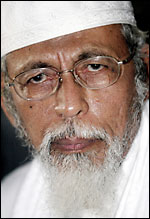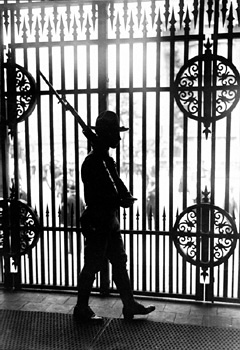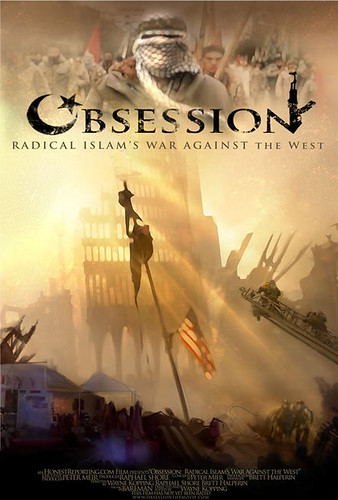WASHINGTON -- Air marshals were told Thursday they will be allowed to dress the way they want and choose their own hotels in order to protect their anonymity while on missions.
Federal Air Marshal Service chief Dana Brown, who has been in the job for five months, said he was changing the rules, starting Sept. 1, after listening to air marshals' concerns. In a memo to the air marshals, Brown said the dress code was changed to "allow you to blend in and not direct attention to yourself, as well as be sufficiently functional to enable you to conduct your law enforcement responsibilities."
From the Desk of Lance Frisk
Federal Air Marshal Service Underchief
Good morning, marshals.
Well, you've all read the news from Chief Brown, I hope. Nobody is more glad than me that the dress code is changing. The rule requiring you to wear white button-down shirts, heavy suits and wing-tip shoes has forced me to listen to a lot of griping. Especially from you women.
But the idea behind the old rule is still the same: Don't be mistaken for an air marshal. Based on the records of a lot of you, that shouldn't be difficult.
You think you can fool anybody by wearing jeans and a T-shirt that says "Hard Rock Cafe Galapagos Islands"? Listen, my fine feathered friends, that's exactly what the hijackers are going to be looking for, now they've read the story in the Post! You imagine we're dealing with a batch of misfits? These guys may be crazier than Michael Jackson sniffing glue but they're not dumb. They're going to expect you to look like everybody else, see, so you've got to be sure not to look like everybody else, know what I'm saying?
So how do you not look like everybody else? You look like Grade-A passenger-walkout material, that's how! I'm glad to say that my two deputy underchiefs got the idea the minute I came up with it. Complimented me on my imagination, even. Here, let me call on Deputy Underchief Ross Flagstaff to tell you a little about how it can work. Ross?

"Allahu Akbar!"
Now let me turn to my other deputy underchief, Bill Climber. Bill, can you fill our marshals in on a little more of the deep-cover technique?
Best way to handle it is by saying something like, "Brother, my instructions from my cell are to keep a low profile, speak only English, not talk on phone, not wave bottle of contact lens fluid around. I do not know your cell or your mission, but our mission is of inestimable importance in overcoming the Crusaders and Zionists! Our cell leader informed us that we might bump in to other brothers on this flight, and said that to divert suspicion from ourselves we should pretend to handcuff and arrest you. I am sure you will see the wisdom in this."
Pretty clever, don't you think? I'm told that a certain highly placed — very highly placed, you know what I'm saying? — person in Washington was told of my theory of disguise and grinned widely and said, "That'll teach those folks, who represent a threat to our country with their weapons of mass destruction, to keep their pea-picking hands off our airliners and passengers, especially those passengers whose family values don't stop at the border, no sir, who are flying off to do jobs that Americans won't do."
That's about it, except remember to wear your daggers under a fold in your clothing. Oh, and don't let anyone see you being given extra screening, or your cover will be blown for sure.






